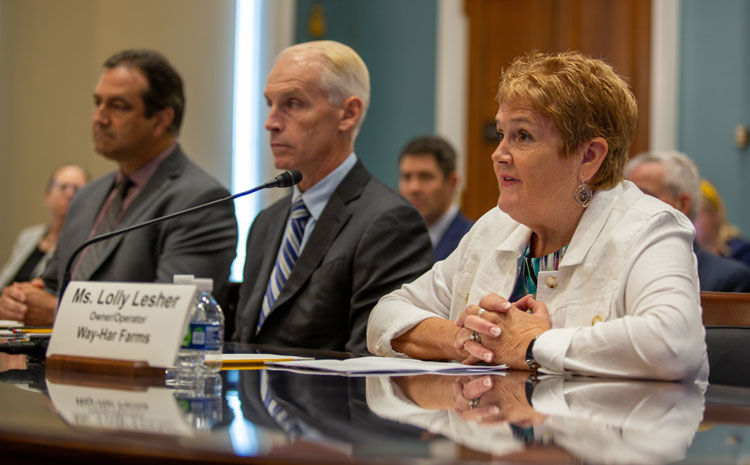
Preparations have begun on a new farm bill and that’s the reason the House Agriculture Committee met on Wednesday, June 22, at the Longworth House Office Building. Presiding over the meeting was House Agricultural Committee Chair David Scott (D-Ga.).
“Dairy farmers are grateful for the work this committee did to reform the dairy safety net in both the 2018 Farm Bill and the Bipartisan Budget Act of 2018,” shared Pennsylvania dairy farmer Lolly Lesher. “Dairy Margin Coverage (DMC) worked as intended in 2021, paying out well over $1.1 billion to participating farmers nationwide, including nearly $89 million to Pennsylvania producers, as they continued to weather the COVID-19 pandemic.
“However, as valuable as the program has been, many farmers have not been able to fully benefit because DMC's underlying production history calculation is outdated. It is critical that farms like mine and my neighbors have an opportunity to update their production history to reflect current on-farm production. 2013 is far too long ago, and other farm safety net programs do not use such an outdated production reference. Many farms have grown to meet market demands or to allow their children to join the farm,” continued the dairy producer who milks 240 cows.
“To that end, we thank this committee for enacting Supplemental Dairy Margin Coverage payments to compensate farmers for incremental production increases since 2014, accounting for a nearly decade-old production history formula. It is critical that this production history adjustment be carried over into the 2023 Farm Bill so that DMC remains a viable safety net,” shared the co-owner of Way-Har Farms.
“Finally, we are grateful that, on par with producers of other commodities, dairy farmers, large and small, now have access to both a Farm Service Agency-run safety net as well as Risk Management Agency tools, such as Dairy Revenue Protection (Dairy-RP) and Livestock Gross Margin-Dairy (LGM-Dairy). These programs give all farmers the ability to adapt their risk management to their needs,” shared Lesher.
Let’s look at the Class I mover
Lesher then went into details about the change in the Class I mover calculation from the “higher of” to a monthly average of Class III and Class IV, plus 74 cents per hundredweight (cwt.). “The new mover was enacted into law on the basis that farm-level revenue would be maintained,” she said, then explained that market conditions didn’t allow that to play out.
“The new Class I mover took effect in May 2019, but the COVID-19 pandemic dramatically undercut the revenue neutrality that formed its foundation,” she continued. “This undermined the orderly marketing of milk and represented a net loss to dairy producers of more than $750 million during the latter half of 2020, including over $141 million in the Northeast Order, which includes much of Pennsylvania,” she explained.
“Work must also be done to avoid a repeat of this scenario in the future. Fundamentally, the current Class I mover saddles dairy farmers with asymmetric risk because it includes an upper limit on how much more Class I skim revenue it can generate for producers than the previous mover, but no lower limit on how much less can be generated than the previous mover,” stated the Pennsylvania dairy farmer.
Labor and labeling
Lesher concluded her testimony on two important topics for dairy. However, those topics were outside the committee’s jurisdiction.
“First, dairy farmers across the country are facing acute shortages of workers even as they work to provide sustainable nutrition for all Americans at a time of rising food costs,” said the Pennsylvania dairy woman. “However, unlike the rest of agriculture, the dairy industry is unable to use the H-2A seasonal agricultural worker visa program because of the year-round nature of dairy production. We strongly urge Congress to enact long-needed legislation to allow dairy to meaningfully access H-2A, and to provide current agricultural workers and their families with permanent legal status.
“Separately, while this committee does not oversee the Food and Drug Administration, it is critical that the agency finally enforce dairy standards of identity to combat the proliferation of imitation products attempting to use dairy's positive reputation in the marketplace when these products are not nutritionally equivalent to real dairy,” Lesher concluded.
To read full transcripts of the testimony, visit “Hearing: “A 2022 Review of the Farm Bill: Dairy Provisions.”








